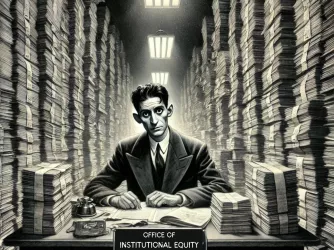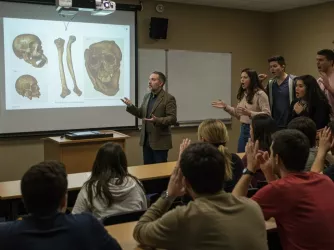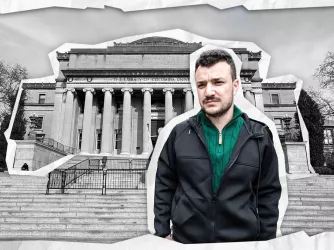Table of Contents
FIRE Statement on Cartoons Depicting Mohammed
The international controversy surrounding the printing of cartoons depicting the prophet Mohammed has been historic in scale: dozens have been killed, riots and protests have taken place all over the world, death threats have been issued against the cartoonists, and some newspapers have openly admitted that they will not publish the cartoons for fear of violent reprisal. It was only a matter of time before a controversy of such magnitude reached America’s college campuses. In recent weeks, students, professors, and student publications have not only reprinted the controversial cartoons but even created their own satirical cartoons depicting Mohammed. As this controversy shows little sign of dissipating and poses questions that will doubtless resurface on campuses for years to come, it is important for the Foundation for Individual Rights in Education (FIRE) to address some of the issues and principles at stake.
First, there can be no question that these cartoons constitute protected speech under the First Amendment—legally speaking, this is not a close call. The First Amendment does not tolerate censorship merely because an image might be offensive to some viewers. As the Supreme Court wrote in Texas v. Johnson, “If there is a bedrock principle underlying the First Amendment, it is that the government may not prohibit the expression of an idea simply because society finds the idea itself offensive or disagreeable.” The Supreme Court showed great prescience in 1949, when it wrote in Terminiello v. Chicago that free speech “may indeed best serve its high purpose when it induces a condition of unrest, creates dissatisfaction with conditions as they are, or even stirs people to anger…. There is no room under our Constitution for a more restrictive view.”
One “exception” to the First Amendment that has emerged as a possible rationale for censoring the cartoons is that they may constitute an “incitement to violence.” This argument, however, misunderstands the nature of “incitement.” Legally defined, “incitement” happens when a speaker encourages imminent lawless action in a context in which it is likely to take place immediately. For example, a speaker exhorting an angry, violent crowd to attack a government office could be found guilty of incitement. However, if a speaker’s words result in violence because people despise what that speaker said and wish to silence him or her, that is a different matter entirely. Telling a speaker that he or she cannot speak because it might provoke an angry mob to violence is called granting a “heckler’s veto.” If society punished people on the basis of how harshly or violently others might react to their words, it would create an incentive for those who disagree to react violently. This would therefore confer a veto on speech to the least tolerant members of society. Lest we embark upon a downward spiral to mob rule, it is extremely dangerous to all of our freedoms to ever grant a heckler’s veto. The Supreme Court has recognized this principle in various ways for decades.
FIRE understands that the fear of violence is powerful, but such a fear must not lead universities to forget that their primary duty is to defend the rights of students and faculty to hold and express their opinions and to promote the perpetual search for truth, not to placate those who would silence them. The First Amendment confers upon authorities both a “positive” and “negative” duty: a “negative” duty not to censor, as well as a “positive” duty to protect speakers from being silenced by the mob. This second aspect of free speech may be the hardest element to implement, but without it, the crudest forms of tyranny could result.
If a single Supreme Court opinion serves as FIRE’s lodestar, it is West Virginia State Board of Education v. Barnette. That opinion, written in 1943, when the United States’ success in the battle against totalitarianism was far from certain, upheld the highest principles of a free society even in the face of the greatest adversity. As Justice Robert Jackson wrote:
Freedom to differ is not limited to things that do not matter much. That would be a mere shadow of freedom. The test of its substance is the right to differ as to things that touch the heart of the existing order. If there is any fixed star in our constitutional constellation, it is that no official, high or petty, can prescribe what shall be orthodox in politics, nationalism, religion, or other matters of opinion or force citizens to confess by word or act their faith therein. If there are any circumstances which permit an exception, they do not now occur to us.
These brave words should remind us that the battle for free speech is often a deadly serious one. The campus free speech debates of the last two decades may give one the false impression that those debates have primarily revolved around issues like politeness, sensitivity, or hurt feelings. But if one looks at the great free speech debates of American history, one discovers that often the concerns of the censors were quite real and serious: they feared riots, bloodshed, threats to global or national security, and even civil war. Even under these fearsome circumstances, American society has time and time again chosen liberty and sunlight over repression. Free speech has not been an easy path, but it is one worth following. Living with liberty often requires courage, but when this most sacred of American principles is threatened, we always seem to find the courage to defend it.
FIRE has been generally pleased thus far with many universities’ official responses to students, faculty, and student groups who have decided to publish or display the Mohammed cartoons. Many universities have shown respect for the independence of the student media and an understanding of the decision to publish the cartoons, even if administrators personally disagreed with the decision. FIRE offers its help to universities who need assistance explaining to critics why even controversial expression must be tolerated. We are also aware of universities where the response may not have been as judicious and we offer our help to students and faculty members who face censorship in its many forms. As we have always done, we are prepared to defend, with every resource at our disposal, the rights of students and faculty whose free speech has been denied.
Greg Lukianoff
Interim President
Foundation for Individual Rights in Education
Recent Articles
FIRE’s award-winning Newsdesk covers the free speech news you need to stay informed.

Navigating the Kafkaesque nightmare of Columbia's Office of Institutional Equity

A picture is worth a thousand words — unless a college district bans it

Intimidating abridgments and political stunts — First Amendment News 461
